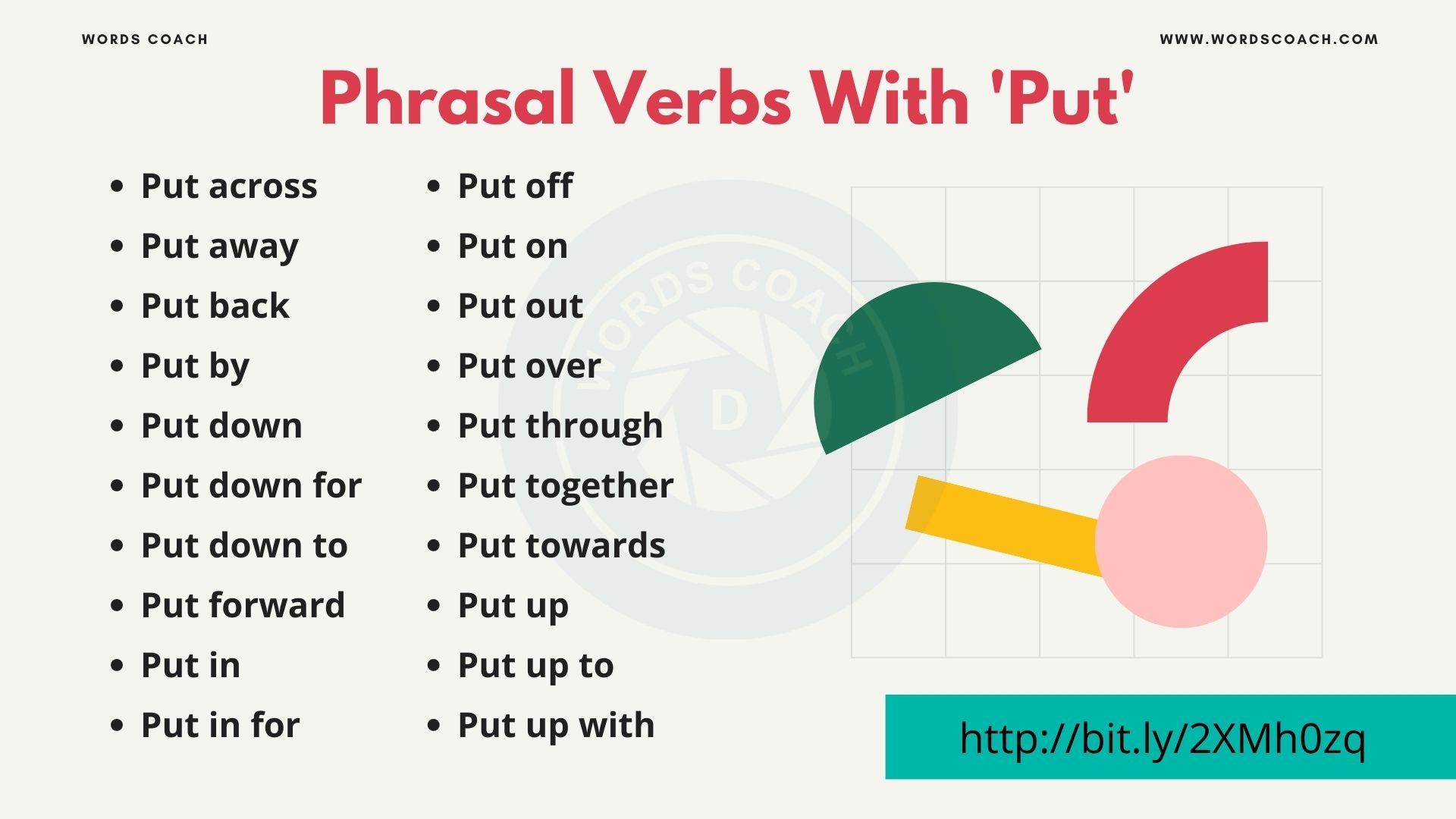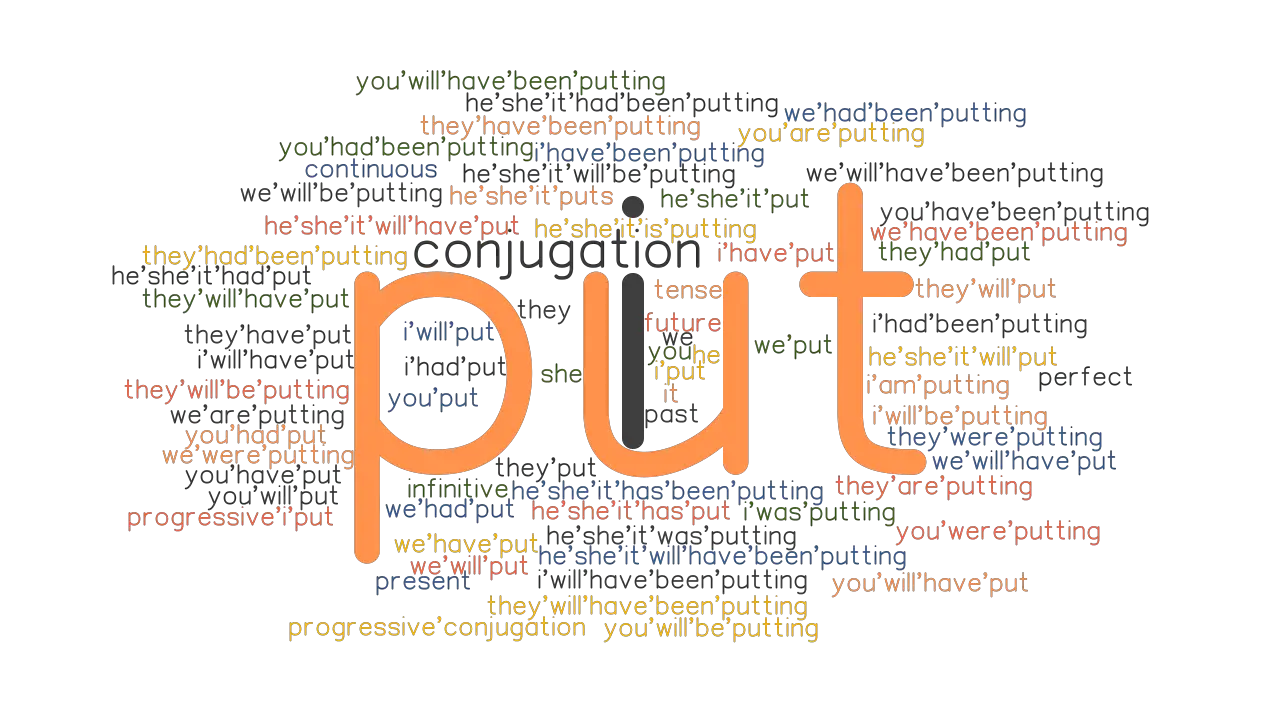Put Verb Forms
Put Verb Forms - Indicative, past tense, participle, present perfect, gerund, conjugation models and irregular verbs. Learn how to conjugate the irregular verb put in all the tenses. 33 rows learn how to conjugate the verb 'put' in different tenses and forms, and what it means to place something in a specific position. Put is pronounced /pʊt/ and serves as a verb with several meanings, such as: To place something in a particular position or location. See the simple past, preterite,. See tables, examples, and alternative names for the base, infinitive, and participle forms. Put means ‘move something into a particular. Learn how to use the irregular verb put in different tenses and forms, with examples and explanations. Conjugate the english verb put:
Learn how to conjugate the verb to put in all tenses and moods, with audio, irregular forms and contractions. Indicative, past tense, participle, present perfect, gerund, conjugation models and irregular verbs. Put is pronounced /pʊt/ and serves as a verb with several meanings, such as: Conjugate the english verb put: See tables, examples, and alternative names for the base, infinitive, and participle forms. 33 rows learn how to conjugate the verb 'put' in different tenses and forms, and what it means to place something in a specific position. See the simple past, preterite,. Put means ‘move something into a particular. To place something in a particular position or location. Learn how to use the irregular verb put in different tenses and forms, with examples and explanations.
See the simple past, preterite,. 33 rows learn how to conjugate the verb 'put' in different tenses and forms, and what it means to place something in a specific position. Learn how to conjugate the irregular verb put in all the tenses. Put is pronounced /pʊt/ and serves as a verb with several meanings, such as: Learn how to conjugate the verb to put in all tenses and moods, with audio, irregular forms and contractions. Indicative, past tense, participle, present perfect, gerund, conjugation models and irregular verbs. See tables, examples, and alternative names for the base, infinitive, and participle forms. Learn how to use the irregular verb put in different tenses and forms, with examples and explanations. Conjugate the english verb put: To place something in a particular position or location.
Put Verb Forms Past Tense, Past Participle & V1V2V3 »
Learn how to use the irregular verb put in different tenses and forms, with examples and explanations. See the simple past, preterite,. Put is pronounced /pʊt/ and serves as a verb with several meanings, such as: See tables, examples, and alternative names for the base, infinitive, and participle forms. Learn how to conjugate the irregular verb put in all the.
What's the Past Tense of Put? Put or Putted?
Put is pronounced /pʊt/ and serves as a verb with several meanings, such as: See tables, examples, and alternative names for the base, infinitive, and participle forms. Conjugate the english verb put: Learn how to use the irregular verb put in different tenses and forms, with examples and explanations. Learn how to conjugate the irregular verb put in all the.
Choose the correct verb from the list below to complete the following
Put means ‘move something into a particular. Indicative, past tense, participle, present perfect, gerund, conjugation models and irregular verbs. Conjugate the english verb put: Learn how to conjugate the verb to put in all tenses and moods, with audio, irregular forms and contractions. Learn how to conjugate the irregular verb put in all the tenses.
PHRASAL VERB PUT Teaching english grammar, English grammar, English
Indicative, past tense, participle, present perfect, gerund, conjugation models and irregular verbs. 33 rows learn how to conjugate the verb 'put' in different tenses and forms, and what it means to place something in a specific position. See the simple past, preterite,. See tables, examples, and alternative names for the base, infinitive, and participle forms. To place something in a.
Phrasal Verbs With 'Put' Word Coach
Put is pronounced /pʊt/ and serves as a verb with several meanings, such as: To place something in a particular position or location. See tables, examples, and alternative names for the base, infinitive, and participle forms. 33 rows learn how to conjugate the verb 'put' in different tenses and forms, and what it means to place something in a specific.
Put Past Simple, Simple Past Tense of Put, Past Participle, V1 V2 V3
Learn how to conjugate the verb to put in all tenses and moods, with audio, irregular forms and contractions. Put means ‘move something into a particular. See the simple past, preterite,. To place something in a particular position or location. Learn how to conjugate the irregular verb put in all the tenses.
verb forms of PuT verb forms in V1,V2 ,V3,V4,V5 shorts ytshorts
See the simple past, preterite,. Learn how to use the irregular verb put in different tenses and forms, with examples and explanations. Indicative, past tense, participle, present perfect, gerund, conjugation models and irregular verbs. Conjugate the english verb put: Put is pronounced /pʊt/ and serves as a verb with several meanings, such as:
Put Past Tense Verb Forms, Conjugate PUT
Learn how to conjugate the irregular verb put in all the tenses. 33 rows learn how to conjugate the verb 'put' in different tenses and forms, and what it means to place something in a specific position. Learn how to conjugate the verb to put in all tenses and moods, with audio, irregular forms and contractions. See the simple past,.
put the verb to be into positive negative and question forms Brainly.lat
Learn how to conjugate the verb to put in all tenses and moods, with audio, irregular forms and contractions. Indicative, past tense, participle, present perfect, gerund, conjugation models and irregular verbs. Conjugate the english verb put: Learn how to conjugate the irregular verb put in all the tenses. Learn how to use the irregular verb put in different tenses and.
What's the Past Tense of Put? Put or Putted?
Learn how to conjugate the verb to put in all tenses and moods, with audio, irregular forms and contractions. See tables, examples, and alternative names for the base, infinitive, and participle forms. To place something in a particular position or location. Put is pronounced /pʊt/ and serves as a verb with several meanings, such as: Learn how to use the.
33 Rows Learn How To Conjugate The Verb 'Put' In Different Tenses And Forms, And What It Means To Place Something In A Specific Position.
To place something in a particular position or location. Learn how to conjugate the verb to put in all tenses and moods, with audio, irregular forms and contractions. Put is pronounced /pʊt/ and serves as a verb with several meanings, such as: Indicative, past tense, participle, present perfect, gerund, conjugation models and irregular verbs.
Learn How To Conjugate The Irregular Verb Put In All The Tenses.
See the simple past, preterite,. See tables, examples, and alternative names for the base, infinitive, and participle forms. Put means ‘move something into a particular. Learn how to use the irregular verb put in different tenses and forms, with examples and explanations.









